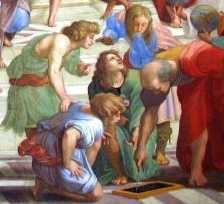The star of light being now risen,
Deum precémur súpplices,
let us humbly beseech God,
ut in diúrnis áctibus
that in our daily actions
Nos servet a nocéntibus.
He may keep us from all harm.
Now in the sun's new dawning ray,
lowly of heart, our God we pray
that He from harm may keep us free
in all the deeds this day shall see.
Linguam refrénans témperet,
Bridling, may He restrain the tongue,
ne litis horror ínsonet,
lest the jarring discord of strife resound;
visum fovéndo cóntegat,
may He lovingly veil our sight
ne vanitátes háuriat.
lest it drink in vanities.
May fear of Him our tongues restrain,
lest strife unguarded speech should stain:
His favoring care our guardian be,
lest our eyes feed on vanity.
Sint pura cordis íntima,
May the inmost rescesses of the heart be pure,
absístat et vecórdia:
and may folly cease;
carnis terat supérbiam
may the pride of the flesh
potus cibíque párcitas.
the sparing use of food and drink wear down.
May every heart be pure from sin,
and folly find no place therein:
scant meed of food, excess denied,
wear down in us the body's pride
Ut cum dies abscésserit,
That when the day has departed,
noctémque sors redúxerit,
and fate has brought back the night,
mundi per abstinéntiam
still pure by virtue of abstinence,
ipsi canámus glóriam.
we may sing His glory.
That when the light of day is gone,
and night in course shall follow on,
we, free from cares the world affords,
may chant the praises that is our Lord's.
Deo Patri sit glória,
eiúsque soli Fílio,
cum Spíritu Paráclito,
in sempitérna saéculum. Amen.
The translation today is all courtesy of Fr. Britt, indeed, this is Hymn #1 in his book. Apparently "Jam lucis orto sidere" was once used at the now-supressed office of Prime. The Catholic Encyclopedia describes the origin of the Office of Prime:
We learn further from Cassian the reason that led to the institution of this office. The office of the night, comprising Matins and Lauds, ended then at sunrise, so that Lauds corresponded to the dawn. After the night offices at Bethlehem, as in the other Palestinian monasteries, the monks might retire to rest. As no other office called them together before Terce, those who were lazy seized the opportunity of prolonging their sleep till nine in the morning, instead of applying themselves to manual work or spiritual reading. To end this abuse, it was decided, in the above monastery, to continue the custom of reposing after the night office, but, to prevent an undue prolongation of sleep, the monks were recalled to choir at the hour of Prime, and after the recital of a few psalms they were to work until Terce (Cassian, "Instit.", III, iv).
Why was Prime supressed? The Vatican II document Sacrosanctum Consilium
state in pargraphs 88 & 89:
88. Because the purpose of the office is to sanctify the day, the traditional sequence of the hours is to be restored so that once again they may be genuinely related to the time of the day when they are prayed, as far as this may be possible. Moreover, it will be necessary to take into account the modern conditions in which daily life has to be lived, especially by those who are called to labor in apostolic works.However, the office is still celebrated by Traditional Catholics, especially by those who adhere to the Extrordinary Form of the Mass (also known as the TLM or Traditional Latin Mass.) It is also still celebrated in some form in the Eastern Rite.
89. Therefore, when the office is revised, these norms are to be observed:
a) By the venerable tradition of the universal Church, Lauds as morning prayer and Vespers as evening prayer are the two hinges on which the daily office turns; hence they are to be considered as the chief hours and are to be celebrated as such.
b) Compline is to be drawn up so that it will be a suitable prayer for the end of the day.
c) The hour known as Matins, although it should retain the character of nocturnal praise when celebrated in choir, shall be adapted so that it may be recited at any hour of the day; it shall be made up of fewer psalms and longer readings.
d) The hour of Prime is to be suppressed.

No comments:
Post a Comment